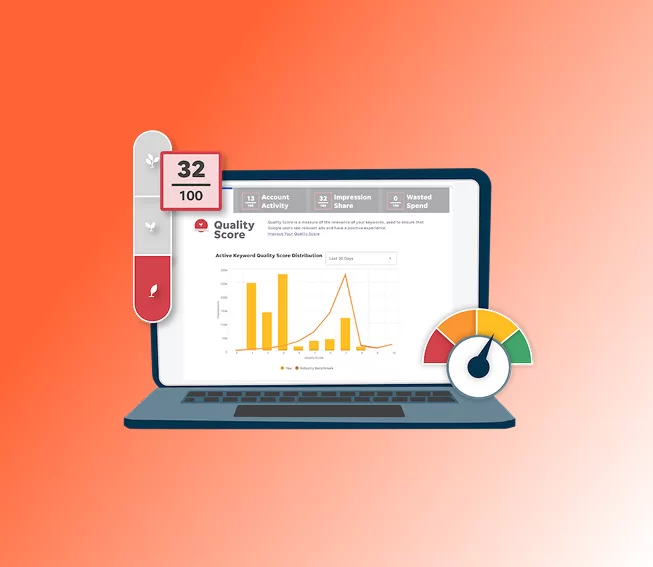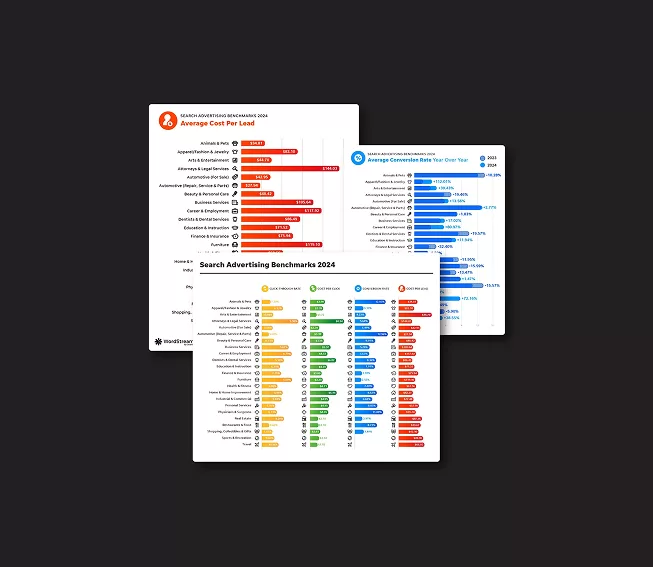If you want to improve your return on investment (ROI) in marketing, four words hold the key to success. “Choose your words wisely.” Some are more impactful than others. So, for your marketing to be its most persuasive and get you that much closer to converting your target customers, you must master word choice.
To help you do that, let’s talk about what marketing trigger words are and how to use them.

Table of contents
- What are trigger words
- Words that spark curiosity
- Words that trigger fear or FOMO
- Words that drive immediate action
- Words that inspire trust
- Words that relieve fears, uncertainties, and doubts
- Words that ooze positivity
- Words that emphasize benefits
- How to use trigger words the right way
What are trigger words?
Trigger words evoke a strong emotional response in readers or viewers, causing them to take an action. In marketing, that action could be inquiring about a product or service.
While some are more subtle, often, these words are also great attention-grabbers. (Take, for example, words like “free,” “sale,” and “limited time only,” which we’ll talk about shortly.)
📚 Free guide download >> 135 of the Best Words & Phrases for Marketing with Emotion
100+ marketing trigger words (and why they work)
There are hundreds of marketing trigger words. We’ll cover 107 here and discuss why they work.
Words that spark curiosity
Our world is busy (and cluttered with marketing messages). To get people to stop and take notice of your marketing, pique their curiosity with words like:
- Obsessed. Obsessions go beyond mild interest. So if, for example, you use a blog headline like, “7 Reasons We’re Obsessed With [Interesting Topic],” it’ll get people wondering the reason for your enthusiasm.
- Discover. Since many people have a natural curiosity about the unknown, an invitation to discover something new can generate interest in your message.
- Stop. This direct command captures attention and gets people wondering why they should take your advice. Especially when used with other attention-grabbers like emojis.

- Controversial. When paired with a specific topic your audience is passionate and opinionated about, this word can make them curious to hear your take.
- Unusual. Whether they know it or not, people tune out marketing for cookie-cutter products and services. The same goes for washed-out ideas and content. Pique their interest by promising something out of the ordinary.
- Pointless or lousy. The claim that something is valueless or subpar always requires logic or proof as backup. So using these words, along with sharing your evidence or POV, can get people to click on an article, watch a video, or take another action.
- Ridiculous or outrageous, both of which are eye-catchers. They get people wondering what’s so absurd about a topic or just how crazy the subject of your marketing is, which means more clicks and conversions for you.

- Annoying or irritating. Imagine the headline, “11 Annoying Things Your Team Wishes You’d Stop Doing” Many people’s first thought would be, “Gosh, I hope I don’t do any of them. Let me look at this list to make sure.” These words prompt action.
- Exposed. Whether for entertainment or education about issues that directly impact them, people love exposés. Use this word to get them wondering about what info you’ve uncovered.
💡 Guide download >> The 36 Best Call to Action Phrases Ever (& Why They Work)
Words that trigger fear or FOMO
Fear—or fear of missing out—is one of the most powerful motivators and a compelling advertising technique. Tap into it with words like:
- Exclusive or insider, which carry an air of privilege. If you can make your audience feel special, you’ll gain both customers and loyal fans.
- Secret, unlock, or mystery. Using terms like these to describe little-known knowledge triggers FOMO in two ways. First, no one wants to be out of the loop. Second, they definitely don’t want to be out of the loop if it could hurt them somehow. In Approachable Design’s case, “unlock” appeals to site visitors’ desire to unleash their unique potential and stand out.

- New or latest. Society is trend-driven. People want to be among the first to try new things. By giving them the opportunity, you can outcompete your competitors.
- Innovative and revolutionary. Implying newness, superiority, and uniqueness, these terms appeal to your target audiences’ desires to be early adopters and enjoy experiences others haven’t had access to yet. Especially when accompanied by attractive visuals that provide extra context like the animated chart on the Lance home page.

- Hate, which is a strong word whether you use it to describe something you hate or something your audience hates. Strong words trigger strong emotional reactions, which can, in turn, prompt physical actions.
- Miserable, anxious, panic, and paralyzed. No one likes these feelings. So lean into them in your marketing messages and then introduce your solution as a way to avoid them. (In copywriting, this is called the Pain Agitate Solution framework.)
- Worse. Speaking of Pain Agitate Solution, highlight how your audience’s problems will worsen if they don’t do what you’re recommending.
- Helpless and surrender. Being without options (or with only the option to give up and give in) is scary. So highlight that, with the help of your product or service, your audience doesn’t have to be in this position.
Words that drive immediate action
Knowing that a good opportunity will only last so long can motivate your audience to take advantage of it now. What words indicate time pressure?
- Sale. Who doesn’t love a good sale? It implies limited time and sets the expectation for getting a good deal on a desirable item.
- Limited. Whether it’s time or supply that’s limited, this word can kick your audience’s FOMO into high gear. Check out how Ashley used both “sale” and “limited-time deals.”

- Now or today. These words clarify the best time to act. Not tomorrow or next week. Now. And the clearer your marketing, the higher your conversion rate.
- Forever. “24 hours left and this deal will be gone forever.” If your offer is right, this phrasing can trigger a download, purchase, or other conversion.
- Deadline, which implies finality. If people don’t take the next step before in time, they know they’ll miss out permanently.
- Instant. “Sign up today for instant access to [valuable thing].” Such promises, if you’ve clearly conveyed the value of what you’re marketing, can be an incentive to take the next step. Opendoor is one brand that puts this word front and center in marketing campaigns.

- Urgent, which emphasizes that your audience can’t afford to wait to take the next step.
- Seize, which implies forcefully grabbing hold of something—perhaps something that’s fleeting. Because it’s so emphatic and can allude to a time limit, it’s a good one to use in marketing.
- Special or special offer. These are great for making your audience feel cared for or like you’re offering them a thoughtful gift or solution.
- Opportunity. While this word can spark excitement, it can also remind people that the best opportunities rarely knock twice. These contrasting connotations can work in your favor, promoting immediate conversions.
Related: Use these words in your direct response copywriting to convert more customers.
Words that inspire trust
Marketing often gets a bad rap so, if you’re going to succeed at it, establishing trust is a must. These trigger words help:
- Because is a good way to hold attention. It indicates an explanation to follow, and sharing the reasoning or proof behind your claims builds the trust you need to get an ROI from marketing.
- If. This tiny word can be a big cliffhanger. Implying that an issue isn’t straightforward, it can get your audience interested in understanding caveats and conditions that could help or hurt them.
- Everyone and popular. These words trigger FOMO and reduce perceived risk since “everyone” has already tested it out. Hence, the reason many pricing pages label one pricing option as the “most popular.”

- Breakthrough. It generates curiosity by alluding to something previously unknown. Plus, it implies a higher quality of information than was previously available. If what you’re offering is superior to alternatives, this word can help differentiate it.
- Reliable or trusted. Especially if your audience has had unsavory experiences with competitors, alleviating concerns about trustworthiness is essential. Besides using these words, prove their accuracy with testimonials and other evidence.
- Research-backed, tested, or proven. As with “reliable” and “trusted,” addressing potential concerns builds confidence in you and your marketing messages. But only if you’re transparent about the research, proof, or test results.
- Absolute, surefire, and guaranteed. The greater the risk of doing something, the harder it is to convince your audience to do it. So speaking in absolute terms and offering guarantees when possible can reduce their hesitation.

- Authority. When possible, allude to the good reputation of or widespread respect for an audience or industry-appointed leader. With phrasing like, “Join us for a 30-minute live interview with industry authority, Jane Doe,” you can borrow from established credibility to boost your own.
Words that relieve fears, uncertainties, and doubts
Similar to words that build trust, trigger words that limit fears, uncertainties, and doubts include:
- Unlimited. “The use cases for this software are virtually unlimited.” “Get unlimited revisions when you sign up for the Pro Plan.” There are tons of ways to use this word but, in any case, it implies endless value. The more value your audience expects from what you offer, the more likely they are to want it.
- Free, affordable, and reduced. If you’re offering something free, shout it from the rooftops. (People love freebies!) Even if not, mentioning affordability or a reduced price can make your offer more accessible or feel like a steal.

- Cure. Rather than minor irritations, “cure” is linked with painful, persistent, or severe problems. A promise of relief from significant pains can grab your audience’s attention.
- Empower. This is a common word in mission and vision statements, website headlines, and elevator pitches. To “empower” implies both that you have the power to do something and that you’re generous enough to give it away for the benefit of others. That being the case, it can create a positive perception of your business.
- Simple or easy. Humans like the path of least resistance and shy away from things they know (or suspect) will be difficult. So mention the simplicity of what you’re offering and give any instructions needed to deliver on that expectation. DesignUp shows how it’s done.

- Overcome or crush, which paints a vivid mental picture of success despite the odds or of being unstoppable. They make people feel capable and powerful. If you can help your target customers overcome doubts about their ability to solve a challenge or achieve a goal, you’re the no-brainer choice to help them along the journey.
Words that ooze positivity
Get people excited and feeling positive, and you’ll have greater influence over them. Trigger words like these can help:
- Love, which prompts curiosity about what you’re marketing and why it’s so special. Use “love” to describe things you or your current customers enjoy and care deeply about, as well as aspects of your business that potential customers will love.
- Boost, enhance or energize. Improvement, encouragement, and recharging something that’s depleted are all desirable when linked with your audience’s pain points and goals. Offer them a boost. For instance, are they feeling unmotivated to keep working toward a goal? Explain how your offer can energize them.

- Passion. Linked to love, “passion” carries a greater intensity. It’s particularly effective for About Us-type content that highlights your values and why you care so much about your target audience.
- Thrilled and rave are both associated with excitement and high energy. Using them transfers that energy to your audience, getting them hyped up about your message.
- Frenzy. Indicating a flurry of activity, “frenzy” creates hype and encourages immediate action. To illustrate, Surfer‘s 2021 Black Friday Frenzy game earned the company over 1,750 new users within a week and earned users six tiers of lifetime perks.

- Vibrant, pure, and natural. All associated with healthfulness and life, these words highlight the value of what you offer. That’s true whether you offer a natural product or want to highlight, for example, your pure, unbiased, no-fluff information on a topic relevant to your audience.
- Attractive, delicious, blissful, delightful. In marketing (and sales), you want potential customers to understand and experience the outcome your products or services will get even before they buy. Descriptive words like these can help you paint the picture that inches them closer to becoming customers.
- Breathtaking, exceptional, and mind-blowing, which highlight superiority, quality, and even luxury. For example, “exceptional” can be a good primer for talking about positive outcomes of your work, perhaps via case studies.
- Inspire or admire. Who inspires you to do what you do and why? Who do you admire? What inspires you about your customers? What stories from current customers could be inspirational to future customers? Questions like these can make great fodder for effective marketing.
- Hope, joy, peace, and comfort. Most everyone wants these. If they’re things you can offer or help your audience achieve, say so. For example, a recurring theme in the marketing of shoe brand Atoms is maximum comfort.

- Win, reward, or reclaim, which appeal to the natural desire to succeed, enjoy the benefits of hard work, and regain rightful ownership of something that’s been lost.
Words that emphasize benefits
No matter what you’re marketing—a product, a service, or an idea—the main question you need to answer is, “What will I get out of investing in this?” These trigger words will help you:
- More. Whether for good or for bad, people often want more, more, more. So, you can generate more business by showcasing ways in which you deliver more value than competitors.
- Growth. Just as “more” can be an attractive prospect, many people are also striving for growth. Got a tool or knowledge that can accelerate progress? Your audience will want to know about it.
- Save or cheaper. If affordability or getting a good deal are concerns for your potential customers, words like “save” may give them the push they need to make a purchase.

- Unparalleled, superior, better, complete, or ultimate. Along with specifics, use terms like these to emphasize how your offer is better than available alternatives. If you deliver on those high expectations, you can gain and retain new customers, including through word-of-mouth marketing.
- Want, need or crave. Talking about customer needs and wants shows that you’ve taken the time and care to understand them, and are worthy of their trust and respect.
- Faster. Playing the long game is tough for many people so, if you can help them achieve goals quickly, make it known. Especially if you can put a number on how many times faster your product or service is.
- Luxury, which can grab attention if, for example, achieving or maintaining a certain image or social status is important to your target market.
- You, which is one of the most powerful words in existence. Whether your message is positive or negative, each reader or viewer will grasp that it’s relevant to them. And the more personal your marketing feels, the better the results you’ll get.

How to use trigger words the right way
None of the words on this list are a replacement for being specific about the features and benefits of your products or services, the outcomes they get, and so on. However, descriptive words can emphasize important points and trigger strong emotions that prompt action. So, in addition to providing straightforward details, think carefully about:
- Your goal for each marketing campaign
- What you want the audience to know or feel when they come across your marketing
- What words will drive home the key points or spark the right emotions
You can always refer back to this list if you need to (or save our graphic below)!







